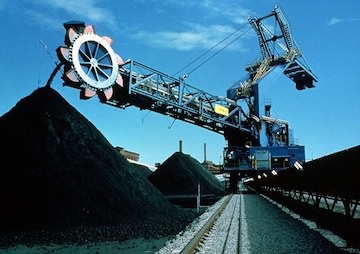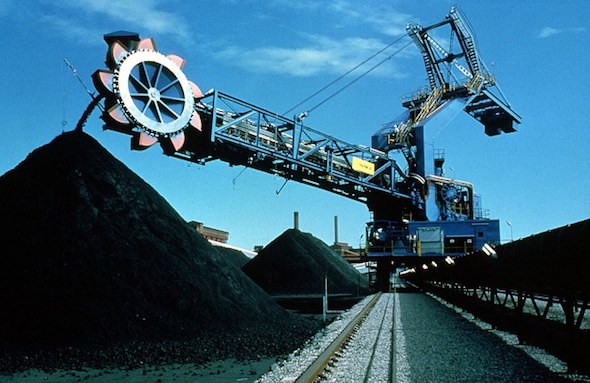A Wrench Thrown Into Coal’s Publicity Machine
An Australian think tank’s data challenges coal industry claims that it drives economic growth, is a key element of alleviating "energy poverty" worldwide and improves quality of life.
By Kieran Cooke, Climate News Network

Heaps of wealth: A dredge machine piles up coal in Australia. Photo by CSIRO via Wikimedia Commons
This Creative Commons licensed piece first appeared at Climate News Network.
LONDON — The coal industry has many friends in high places, and none more so than Tony Abbott, prime minister of Australia — one of the world’s major producers of a fuel that earns the country billions from exports.
“Coal is vital for the future energy needs of the world,” Abbott said recently. “So let’s have no demonisation of coal — coal is good for humanity.”
But a new report by researchers in Australia seeks to debunk what it considers to be myths promulgated by the powerful worldwide coal industry and its allies.
The report by the Australia Institute, an independent public policy thinktank, says claims by lobbyists that coal is a main driver of economic growth are false.
Slower growth
Data shows that coal use has grown much slower than global economic growth, says the report, “All Talk and No action: The Coal Industry and Energy Poverty”.
It points out that “developed countries have reduced coal use while economic growth has been unaffected. Developing countries are now the major users, but with alternatives becoming cheaper, they are likely to reduce coal use much earlier in their development.”
“Coal use is often associated with lower life expectancy due to health impacts”
The report also attacks industry claims that coal use increases life expectancy and quality of life. “On the contrary,” it says, “coal use is often associated with lower life expectancy due to health impacts of indoor and outdoor air pollution and the global health impacts of climate change.”
The study says that although access to electricity might initially improve quality of life, once basic electricity facilities are in place there is little correlation between increased electricity uptake and improved living conditions.
Talk in the coal industry about tackling energy poverty is just public relations spin, says the report, and it questions whether the coal industry itself believes its own claims.
It is significant, the study says, that coal concerns that choose to become involved in electricity and poverty alleviation schemes in poorer parts of the world support projects connected with solar technology or small hydro and gas-fired facilities, rather than with far more expensive coal-fired power installations.
Polluting gases
The report also takes issue with claims by the coal industry that coal is becoming cleaner. What is meant by clean coal varies widely: although many power plants and other enterprises have reduced coal-related emissions of sulphur oxide and nitrogen oxide, coal still releases into the atmosphere enormous amounts of CO2 — by far the most polluting of greenhouse gases.
Meanwhile, progress on carbon capture and storage (CCS) — the process through which emissions from coal-powered plants and other industrial concerns are captured and stored deep below the Earth’s surface — has been slow.
There are only 13 such projects in operation, and together they are capable of sequestering only 25 million tonnes of carbon dioxide per year — less than one percent of the world’s total annual emissions.
To put this in perspective, the report says, 33,376 million tonnes of CO2 were emitted worldwide in 2011, with the US emitting 5,420 million tonnes, and Australia — which has a much smaller population — emitting 400 million tonnes.
It concludes: “Addressing the challenges of energy poverty will become even more difficult if public relations campaigns are able to influence government policies away from genuine solutions towards spending that benefits the coal industry. The real solutions to energy poverty do not focus on coal.”
Your support matters…Independent journalism is under threat and overshadowed by heavily funded mainstream media.
You can help level the playing field. Become a member.
Your tax-deductible contribution keeps us digging beneath the headlines to give you thought-provoking, investigative reporting and analysis that unearths what's really happening- without compromise.
Give today to support our courageous, independent journalists.






You need to be a supporter to comment.
There are currently no responses to this article.
Be the first to respond.